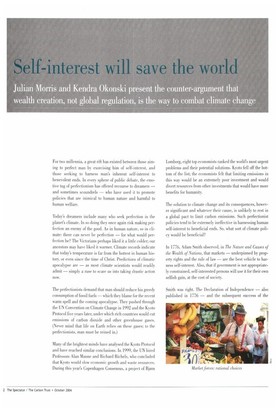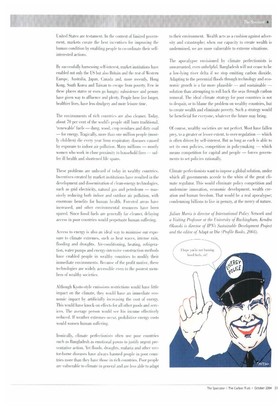elf-interest will save the wor
u 'an orris and enu ra Okong i present le counter-argument t 121 wealth creation, not global regulation, is the way to combat climate change
For two millennia, a great rift has existed between those aiming to perfect man by exorcising him of self-interest, and those seeking to harness man's inherent self-interest to benevolent ends. In every sphere of public debate, the emotive tug of perfectionism has offered recourse to dreamers — and sometimes scoundrels — who have used it to promote policies that are inimical to human nature and harmful to human welfare.
Today's dreamers include many who seek perfection in the planet's climate. In so doing they once again risk making perfection an enemy of the good. As in human nature, so in climate: there can never be perfection — for what would perfection be? The Victorians perhaps liked it a little colder; our ancestors may have liked it warmer. Climate records indicate that today's temperature is far from the hottest in human history. or even since the time of Christ. Predictions of climatic apocalypse are — as most climate scientists would readily admit — simply a ruse to scare us into taking drastic action now.
The perfectionists demand that man should reduce his greedy consumption of fossil fuels which they blame for the recent warm spell and the coming apocalypse. They pushed through the UN Convention on Climate Change in 1992 and the Kyoto Protocol five years later, under which rich countries would cut emissions of carbon dioxide and other greenhouse gases. (Never mind that life on Earth relies on these gases; to the perfectionists, man must be reined in.)
Many of the brightest minds have analysed the Kyoto Protocol and have reached similar conclusions. In 1999, the UN hired Professors Alan Marine and Richard Richels, who concluded that Kyoto would slow economic growth and waste resources. During this year's Copenhagen Consensus, a project of Bjorn Lomborg, eight top economists ranked the world's most urgent problems and their potential solutions. Kyoto fell off the bottom of the list; the economists felt that limiting emissions in this way would be an extremely poor investment and would divert resources from other investments that would have more benefits for humanity.
The solution to climate change and its consequences, however significant and whatever their cause, is unlikely to rest in a global pact to limit carbon emissions. Such perfectionist policies tend to be extremely ineffective in harnessing human self-interest to beneficial ends. So, what sort of climate policy would be beneficial?
In 1776, Adam Smith observed, in The Nature and Causes of the Wealth of Nations, that markets — underpinned by property rights and the rule of law — are the best vehicle to harness self-interest. Also, that if government is not appropriately constrained, self-interested persons will use it for their own selfish gain, at the cost of society.
Smith was right. The Declaration of Independence — also published in 1776 — and the subsequent success of the United States are testament, in the context of limited government, markets create the best incentives for improving the human condition by enabling people to co-ordinate their selfinterested actions.
By successfully harnessing self-interest, market institutions have enabled not only the US but also Britain and the rest of Western Europe, Australia, Japan, Canada and, more recently, Hong Kong, South Korea and Taiwan to escape from poverty. Few in these places starve or even go hungry; subsistence and penury have given way to affluence and plenty. People here live longer, healthier lives, have less drudgery and more leisure time.
The environments of rich countries are also cleaner. Today. about 70 per cent of the world's people still burn traditional, 'renewable' fuels — dung, wood, crop residues and dirty coal — for energy. Tragically, more than one million people (mostly children) die every year from respiratory diseases caused by exposure to indoor air pollution. Many millions — mostly women who work in close proximity to household fires — suffer ill health and shortened life spans.
These problems are unheard of today in wealthy countries. Incentives created by market institutions have resulted in the development and dissemination of clean-energy technologies, such as grid electricity, natural gas and petroleum — massively reducing both indoor and outdoor air pollution, with enormous benefits for human health. Forested areas have increased, and other environmental resources have been spared. Since fossil fuels are generally far cleaner, delaying access in poor countries would perpetuate human suffering.
Access to energy is also an ideal way to minimise our exposure to climate extremes, such as heat waves, intense min, flooding and droughts. Air-conditioning, heating, refrigeration, water pumps and energy-intensive construction methods have enabled people in wealthy countries to modify their immediate environments. Because of the profit motive, these technologies are widely accessible even to the poorest members of wealthy societies.
Although Kyoto-style emissions restrictions would have little impact on the climate, they would have an immediate economic impact by artificially increasing the cost of energy. This would have knock-on effects for all other goods and services. The average person would see his income effectively reduced. If weather extremes occur, prohibitive energy costs would worsen human suffering.
Ironically, climate perfectionists often use poor countries such as Bangladesh as emotional pawns to justify urgent preventative action. Yet floods, droughts, malaria and other vector-borne diseases have always harmed people in poor countries more than they have those in rich countries. Poor people are vulnerable to climate in general and are less able to adapt to their environment. Wealth acts as a cushion against adversity and catastrophe; when our capacity to create wealth is undermined, we are more vulnerable to extreme situations.
The apocalypse envisioned by climate perfectionists is unwarranted, even unhelpful. Bangladesh will not cease to be a low-lying river delta if we stop emitting carbon dioxide. Adapting to the perennial floods through technology and economic growth is a far more plausible — and sustainable — solution than attempting to roll back the seas through carbon removal. The ideal climate strategy for poor countries is not to despair, or to blame the problem on wealthy countries, but to create wealth and eliminate poverty. Such a strategy would be beneficial for everyone, whatever the future may bring.
Of course, wealthy societies are not perfect. Most have fallen prey, to a greater or lesser extent, to over-regulation which is often driven by self-interest. But as long as each is able to set its own policies, competition in policyinaking which means competition for capital and people — forces governments to set policies rationally.
Climate perfectionists want to impose a global solution, under which all governments accede to the whim of the great climate regulator. This would eliminate policy competition and undermine innovation, economic development, wealth creation and human freedom. That would he a real apocalypse; condemning billions to live in penury, at the mercy of nature.
Julian Morris is director of International Policy Network and a Visiting Professor at the University of Buckingham. Kendra Okonski is director of IPN's Sustainable Development Project and the editor of Adapt or Die (Profile Rooks, 2003).



















































































































 Previous page
Previous page